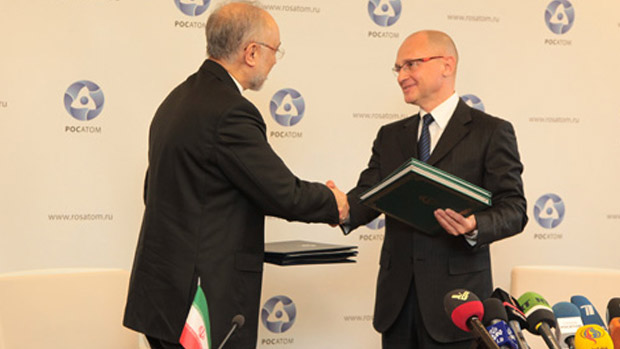Russia signs controversial deal to build nuclear reactors in Iran
The deal between Moscow and Tehran has 'set alarm bells ringing' in the West and could jeopardise talks

A free daily email with the biggest news stories of the day – and the best features from TheWeek.com
You are now subscribed
Your newsletter sign-up was successful
Russia has agreed to build several nuclear reactors in Iran, just two weeks before international talks on reducing the country's nuclear capabilities are set to conclude.
Officials in Moscow and Tehran agreed to the construction of two nuclear reactors in Bushehr, with scope for up to six more across the country after the first two are complete.
At the signing of the deal, Iran's nuclear chief Ali Akbar Salehi described it as "a turning point in the development of relations between our countries".
The Week
Escape your echo chamber. Get the facts behind the news, plus analysis from multiple perspectives.

Sign up for The Week's Free Newsletters
From our morning news briefing to a weekly Good News Newsletter, get the best of The Week delivered directly to your inbox.
From our morning news briefing to a weekly Good News Newsletter, get the best of The Week delivered directly to your inbox.
Rosatom, the Russian state nuclear power company has said the reactors represent a "peaceful use" of atomic energy. It says the construction of the plants will be entirely supervised by the global watchdog International Atomic Energy Agency (IAEA), to ensure that the nuclear non-proliferation agreements are met.
Russia, which currently holds roughly 40 per cent of the world’s uranium enrichment capacity, has also promised to remove the uranium fuel it supplies once the reactors have been built. This, it says, will ensure that they are not used in the manufacture of nuclear weapons, the New York Times reports.
However, the timing of the deal has "raised eyebrows" in the West. In two weeks, long running talks between Iran and six world powers – the US, the UK, France, Germany, China and Russia – are expected to reach their conclusion.
World leaders had been hoping that Iran would finally sign a deal to scale back its nuclear programme. In exchange, international sanctions against the nation were to be loosened.
A free daily email with the biggest news stories of the day – and the best features from TheWeek.com
The possibility that fuel rod components could be built in Iran has "set alarm bells ringing" across Europe and in Washington, according to the Financial Times. "Any bilateral deal that allows Iran to continue an indigenous enrichment programme could jeopardise the entire P5+1 talks".
The breakdown in relations between Russia and the West has raised concerns that the talks could be affected. Some analysts have suggested that Russia would not benefit from the lifting of sanctions against Iran, as the surge in Iranian oil would lower oil prices and worsen Russia's economic problems.
-
 The ‘ravenous’ demand for Cornish minerals
The ‘ravenous’ demand for Cornish mineralsUnder the Radar Growing need for critical minerals to power tech has intensified ‘appetite’ for lithium, which could be a ‘huge boon’ for local economy
-
 Why are election experts taking Trump’s midterm threats seriously?
Why are election experts taking Trump’s midterm threats seriously?IN THE SPOTLIGHT As the president muses about polling place deployments and a centralized electoral system aimed at one-party control, lawmakers are taking this administration at its word
-
 ‘Restaurateurs have become millionaires’
‘Restaurateurs have become millionaires’Instant Opinion Opinion, comment and editorials of the day
-
 Epstein files topple law CEO, roil UK government
Epstein files topple law CEO, roil UK governmentSpeed Read Peter Mandelson, Britain’s former ambassador to the US, is caught up in the scandal
-
 Iran and US prepare to meet after skirmishes
Iran and US prepare to meet after skirmishesSpeed Read The incident comes amid heightened tensions in the Middle East
-
 Israel retrieves final hostage’s body from Gaza
Israel retrieves final hostage’s body from GazaSpeed Read The 24-year-old police officer was killed during the initial Hamas attack
-
 China’s Xi targets top general in growing purge
China’s Xi targets top general in growing purgeSpeed Read Zhang Youxia is being investigated over ‘grave violations’ of the law
-
 Panama and Canada are negotiating over a crucial copper mine
Panama and Canada are negotiating over a crucial copper mineIn the Spotlight Panama is set to make a final decision on the mine this summer
-
 Why Greenland’s natural resources are nearly impossible to mine
Why Greenland’s natural resources are nearly impossible to mineThe Explainer The country’s natural landscape makes the task extremely difficult
-
 Iran cuts internet as protests escalate
Iran cuts internet as protests escalateSpeed Reada Government buildings across the country have been set on fire
-
 US nabs ‘shadow’ tanker claimed by Russia
US nabs ‘shadow’ tanker claimed by RussiaSpeed Read The ship was one of two vessels seized by the US military